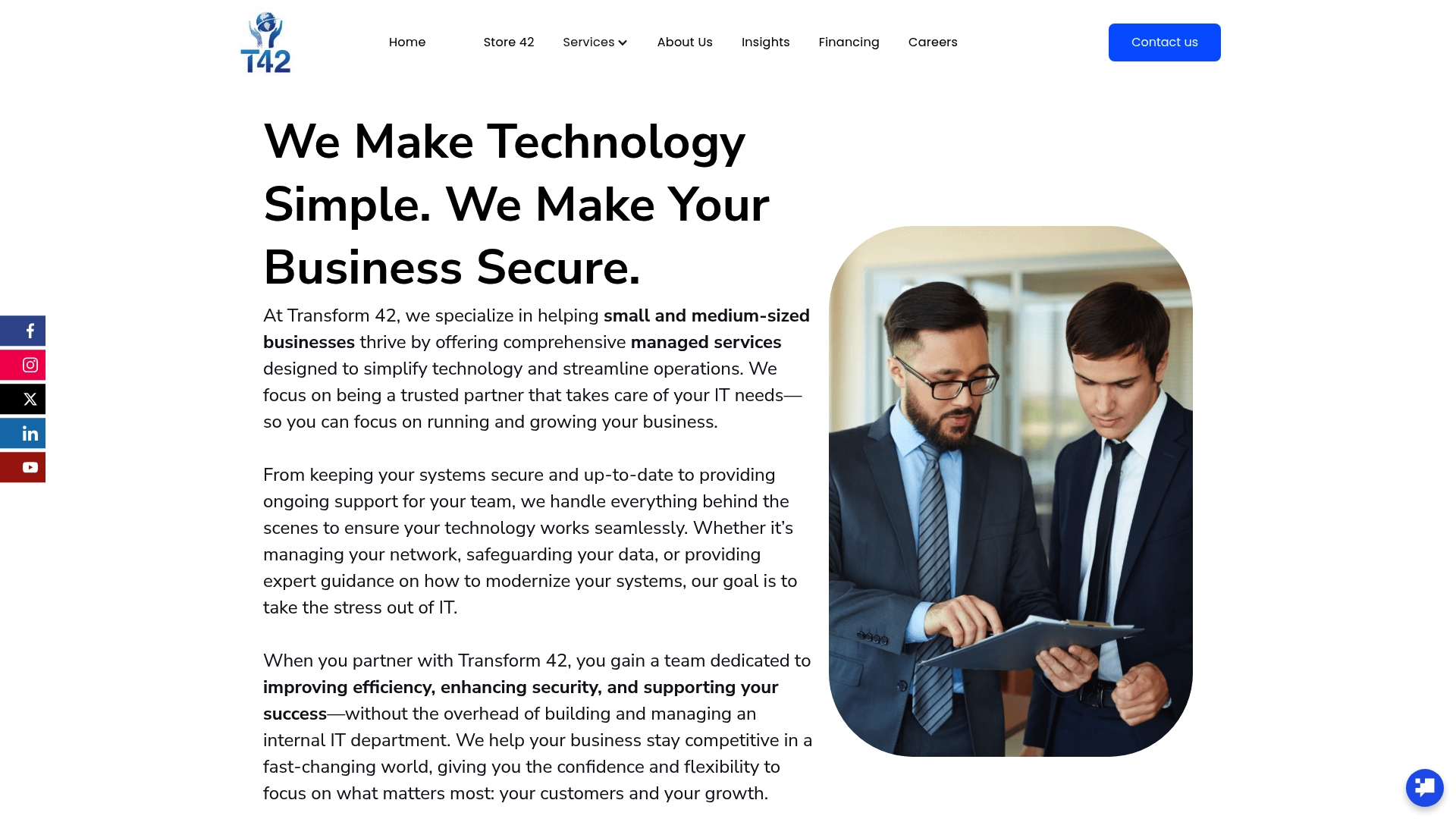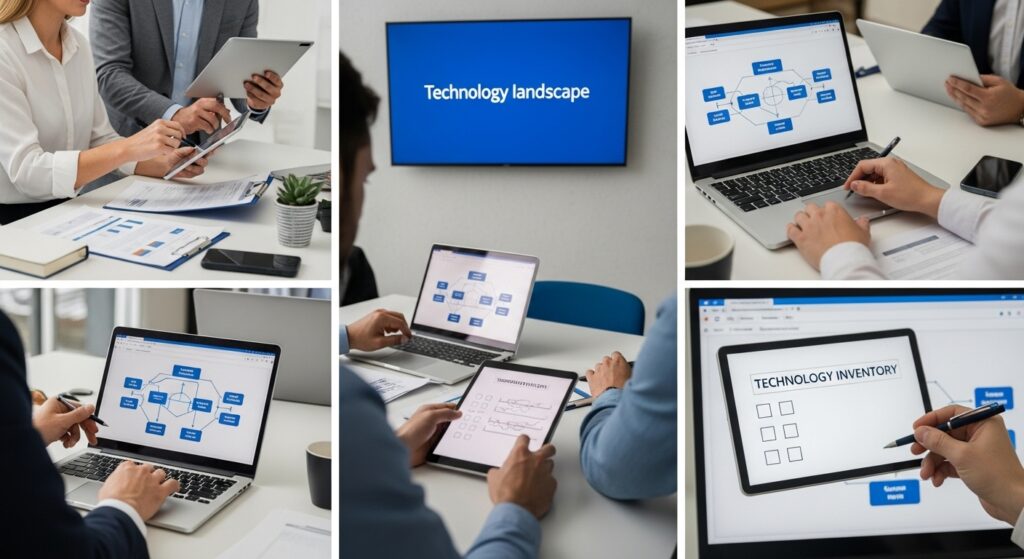IT consulting seems like a technical service for fixing computer issues, but that idea could not be further from the truth. Imagine that companies using professional IT consulting services can see up to a 30 percent increase in operational efficiency. Now here is what most people miss—IT consultants do not just solve problems, they actually help businesses rethink how technology fuels their entire strategy.
Quick Summary
TakeawayExplanationIT consulting aligns technology with business goals.IT consultants provide strategic guidance to ensure that technological solutions support overall organizational objectives.Consultants assess and improve existing technology.They analyze current systems, identify inefficiencies, and recommend tailored solutions to enhance operational performance.Industry-specific approaches are crucial.Different sectors require customized consulting strategies to address unique technological challenges and compliance requirements.Collaboration enhances value creation.IT consulting thrives on a partnership model, enabling knowledge exchange between consultants and client employees for better results.IT consulting is essential for competitive advantage.Leveraging expert technology advice empowers businesses to navigate complexities and capitalize on digital opportunities effectively.
What is IT Consulting and Its Purpose?
IT consulting represents a strategic professional service designed to help organizations optimize their technology infrastructure, align technological capabilities with business objectives, and drive digital transformation. Unlike traditional technical support, IT consulting provides comprehensive guidance that bridges technological solutions with organizational goals.
Understanding the Core Role of IT Consulting
At its fundamental level, IT consulting involves expert professionals who analyze an organization’s existing technological ecosystem, identify potential improvements, and recommend strategic solutions. These consultants bring specialized knowledge across various technological domains including network infrastructure, cybersecurity, cloud computing, software development, and digital strategy.
The primary purpose of IT consulting extends beyond mere technical recommendations. Consultants serve as critical strategic partners who help businesses:
- Navigate complex technological landscapes
- Reduce operational inefficiencies
- Implement cutting-edge technological solutions
- Minimize technological risks
- Optimize technology investments
Strategic Value for Modern Businesses
In an increasingly digital world, IT consulting has become essential for organizations seeking competitive advantages. According to OECD research on digital transformation, businesses that effectively leverage technology consulting can significantly improve their operational efficiency and strategic positioning.
IT consultants provide objective, external perspectives that internal teams might overlook. They bring deep technological expertise combined with industry-specific insights, enabling businesses to make informed decisions about technological investments, infrastructure upgrades, and digital transformation strategies.
The consulting process typically involves comprehensive assessments, detailed technological audits, strategic planning, implementation support, and ongoing optimization recommendations. By partnering with skilled IT consultants, organizations can transform technological challenges into strategic opportunities for growth and innovation.
Why IT Consulting Matters for Businesses
In today’s rapidly evolving technological landscape, IT consulting has transformed from a luxury service to a critical business necessity. Organizations across industries recognize that strategic technological guidance can determine their competitive positioning, operational efficiency, and long-term sustainability.
Strategic Technology Investment and Risk Management
Businesses face significant challenges when navigating complex technological environments. IT consultants provide essential expertise that helps organizations make informed decisions about technology investments, minimize potential risks, and develop robust digital strategies.

Key benefits of IT consulting for businesses include:
- Objective technological assessments
- Customized strategic recommendations
- Cost-effective technology implementation
- Enhanced cybersecurity protocols
- Streamlined operational processes
Bridging Knowledge and Performance Gaps
According to research published in the International Conference on Applied Sciences, management consulting services play a crucial role in helping organizations improve processes and achieve business objectives. IT consultants act as critical intermediaries who translate complex technological concepts into actionable business strategies.
These professionals bring specialized knowledge that most internal teams lack. They understand emerging technological trends, can evaluate existing infrastructure, and recommend solutions that align with specific business goals. By providing external perspectives, IT consultants help organizations overcome internal limitations and technological blind spots.
Moreover, IT consulting enables businesses to access advanced expertise without maintaining expensive full-time technical teams. Small and medium-sized enterprises particularly benefit from this model, gaining access to high-level technological guidance while managing resource constraints. The result is a more agile, technologically sophisticated approach to business growth and innovation.

How IT Consulting Works in Different Industries
IT consulting is not a one-size-fits-all service but a dynamic, adaptive approach tailored to each industry’s unique technological challenges and strategic objectives. The methodology of IT consulting varies significantly across different sectors, reflecting the specialized technological requirements and regulatory landscapes of each field.
Industry-Specific Technological Approaches
Each industry demands a nuanced approach to technological integration and digital transformation. The consulting process involves deep understanding of sector-specific challenges, technological ecosystems, and strategic goals.
Key characteristics of industry-specific IT consulting include:
- Customized technological assessments
- Sector-specific regulatory compliance strategies
- Tailored digital transformation roadmaps
- Specialized technological risk management
- Performance optimization techniques
Collaborative Value Creation Process
According to research published in Electronic Markets, IT consulting operates through a collaborative value co-creation model. Consultants and client employees interact to exchange specialized competencies, knowledge, and skills, ensuring that technological solutions are precisely aligned with organizational objectives.
In healthcare, IT consultants might focus on electronic health record system integration and HIPAA compliance. Financial services consulting emphasizes cybersecurity, regulatory technology, and digital banking platforms. Manufacturing sectors require consultants skilled in industrial automation, supply chain digital transformation, and enterprise resource planning systems.
The consulting engagement typically follows a structured approach: initial assessment, strategic planning, implementation support, and continuous optimization.
By providing targeted expertise, IT consultants help organizations across industries navigate complex technological landscapes, minimize risks, and unlock competitive advantages through strategic technological investments.
Below is a comparison table summarizing how IT consulting tailors its approaches to different industry needs and priorities discussed in the article.
IndustryPrimary Focus AreasKey Technological ChallengesConsulting ApproachHealthcareElectronic health records, complianceData privacy, HIPAA regulationsIntegration, regulatory alignmentFinancial ServicesCybersecurity, digital bankingFraud risk, regulatory technologySecurity, process automationManufacturingIndustrial automation, ERP systemsLegacy systems, supply chain integrationProcess automation, digitizationRetailOmnichannel digital experiencesE-commerce integration, customer experienceDigital strategy, customer insightsEducationTechnology integration, remote learningScalability, effective adoptionDigital transformation, support
Key Concepts of IT Consulting and Its Impact
IT consulting represents a sophisticated approach to technological strategy that goes beyond traditional technical support. It encompasses a comprehensive framework of methodologies, frameworks, and strategic interventions designed to transform organizational technological capabilities and drive business performance.
Strategic Technology Management Framework
At its core, IT consulting operates through a structured methodology that helps organizations align technological investments with broader business objectives. This framework involves systematic assessment, strategic planning, implementation, and continuous optimization of technological resources.
Critical components of this strategic approach include:
- Comprehensive technological infrastructure evaluation
- Business and technology alignment strategies
- Risk management and mitigation protocols
- Performance measurement and benchmarking
- Continuous technological innovation support
Transformative Business Capabilities
According to research exploring enterprise architecture capabilities, effective IT consulting can fundamentally transform organizational capabilities by enhancing process innovation and strategic technological alignment. The impact extends far beyond technical recommendations, creating pathways for comprehensive business transformation.
IT consultants function as strategic partners who translate complex technological concepts into actionable business strategies. They help organizations navigate technological complexity, identify emerging opportunities, and develop robust digital transformation roadmaps. By providing external expertise and objective perspectives, these professionals enable businesses to make informed technological investments that drive competitive advantages.
The ultimate goal of IT consulting is not merely technological implementation but creating a dynamic, adaptive organizational ecosystem capable of responding quickly to technological disruptions and market changes. Through strategic guidance, risk management, and innovative thinking, IT consultants empower businesses to transform technological challenges into opportunities for growth and innovation.
Real-World Applications of IT Consulting Services
IT consulting services extend far beyond theoretical recommendations, delivering tangible solutions that address complex technological challenges across diverse business environments. These practical applications demonstrate the transformative potential of strategic technological interventions in real-world organizational contexts.
Sector-Specific Technological Transformation
Each industry presents unique technological requirements that demand specialized consulting approaches. IT consultants develop targeted strategies that address sector-specific challenges, enabling organizations to leverage technology as a competitive advantage.
Key real-world application areas include:
- Healthcare digital infrastructure optimization
- Financial services cybersecurity enhancement
- Manufacturing process automation
- Retail omnichannel digital experiences
- Educational technology integration
Strategic Digital Implementation Strategies
According to research published in Technological Forecasting & Social Change, IT consulting enables businesses to adapt to rapid technological changes through comprehensive digital risk management and strategic planning. Consultants work closely with organizations to:
Identify technological gaps: Conduct thorough assessments of existing technological infrastructure.Design custom solutions: Develop tailored technological strategies aligned with organizational goals.Implement transformative technologies: Support seamless integration of advanced technological systems.
In practice, this might involve helping a healthcare provider modernize patient record systems, assisting a manufacturing company in implementing industrial automation, or guiding a financial institution through complex cybersecurity upgrades. The goal remains consistent: translating technological potential into measurable business value through expert strategic guidance.
Ready to Turn Technology Challenges into Business Growth?
Struggling to keep up with new technology trends or worried your current IT strategy might be holding your business back? As explained in the article, many companies face gaps between their goals and their digital capabilities. It’s easy to feel uncertain about technological investments, digital transformation, and how to align innovative IT solutions with real business results. If recent risks, rising tech complexity, or the need for stronger security sound familiar, your organization is not alone.

Now is the perfect time to take control of your future. Let Transform 42 Inc. help guide your journey with expert IT consulting designed for small and medium-sized businesses. See how our tailored digital transformation and managed IT services can bridge your current gaps and drive measurable results. Start your transformation journey today and secure a competitive edge before technology changes again. Discover what your business can truly achieve with the right IT partner.
Frequently Asked Questions
What is the primary purpose of IT consulting?
IT consulting aims to help organizations optimize their technology infrastructure, align technological capabilities with business objectives, and drive digital transformation.
How can IT consulting benefit my business?
IT consulting can enhance operational efficiency, reduce technological risks, provide objective assessments, and offer strategic recommendations tailored to your organization’s specific needs.
What industries can benefit from IT consulting services?
IT consulting is valuable across various industries, including healthcare, financial services, manufacturing, retail, and education, with tailored strategies for each sector’s unique technological challenges.
How does the IT consulting process typically work?
The IT consulting process usually follows a structured approach involving an initial assessment, strategic planning, implementation support, and ongoing optimization to ensure technology aligns with business goals.
The following table outlines the main phases in the standard IT consulting process as described, helping clarify how each step builds on the previous toward business value.
PhaseDescriptionInitial AssessmentConsultants evaluate existing technological infrastructure and identify inefficiencies.Strategic PlanningThey develop actionable plans aligning technology with business goals.Implementation SupportIT consultants assist with the rollout and integration of new solutions.Ongoing OptimizationContinuous improvement measures ensure solutions adapt to business needs over time.





